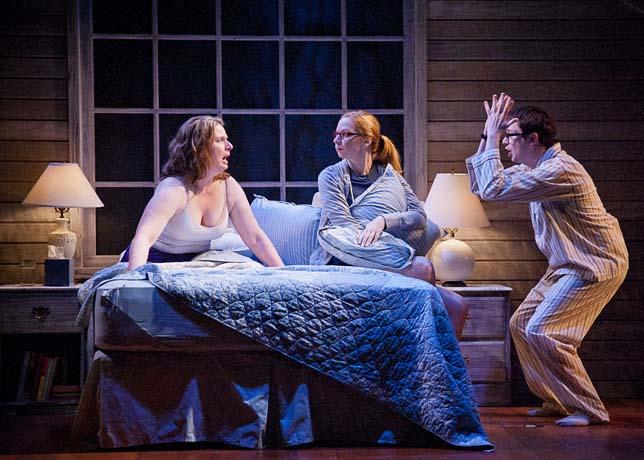Theater J’s ‘Body Awareness’: P.C. Fun With Phyllis and Joyce
By • September 13, 2012 0 2084

Annie Baker is kind of sneaky, or at least she writes plays that feel like they’re written by a cat burglar.
Her plays—including “Body Awareness,” now receiving an affecting, imaginative staging at Theater J, as well as the hit, “Circle Mirror Transformation,” performed at the Studio two seasons ago—sneak up on you. They’re not so much disarming as surprising—like the moment in a story where someone wipes the dirt off the orphan’s face and finds out he is heir to the kingdom.
The way Baker operates is to set you up. She lets you make assumptions about characters, about what’s likely to happens next, then makes you throw the assumptions in the trash as you move along. It’s not that the assumptions are wrong, entirely, or that some things that you see coming from a distance doesn’t happen. It’s just that the seeming simplicity of her work and her use of language, her authenticity, if you will, seduces you into thinking that the play is simple, too, that it can’t be rescued from its apparent pitfalls. It’s complicated, and awkward, but it opens your eyes and heart at the end.
“Body Awareness” is an earlier work and centers around an event called “Body Awareness Week,” a celebration of just about politically correct cliché in the world, including the sin of irrefutable, high-minded dead-seriousness. At its center are Joyce and Phyllis, a lesbian couple in a household that also includes Jared, Joyce’s 21-year-old son from a failed marriage, who the couple believes is suffering from Asperger’s Syndrome, a belief which Jared bitterly and sometimes savagely fights. Phyllis, supremely confident in her view of the world, a professor at the local college, is running “Body Awareness Week,” with a kind of flinty assurance and cheerfulness resembling that of the Church Lady. Throw in a very laid-back, somewhat-on-the-make photographer named Frank Bonitatibus, who’s got a show in the festival of artsy photographs of naked women, and you’ve got a self-awareness-and-the-rumblings of discontent-week in the house.
As with “Circle Mirror,” the characters are flawed, and initially at least, not particularly likeable. They have annoying qualities at first blush: Phyllis, who preaches the gospel of gender and language PC, has a tendency toward the pedantic translating into a superior tone; Joyce oozes earth-mother protectiveness and accommodation; Jared, whether he has Asperger’s or not, is a bundle of treacherous emotions that are difficult to deal with and Frank, in his cool vest, thin-legged often-washed bluejeans and beard, is an aging hippy, his male libido barely in check. He is also a catalyst for friction between the two women and the source of manly advice (of the worst sort) for Jared, who’s never had a girlfriend and calls himself an auto-dactic.
In an hour and a half with no intermission (this was also the case for “Circle Mirror”), “Body Awareness” director Eleanor Holdridge deftly lets the play take its time and lets us almost move in with the characters and the sparse space of the set which is the cabin-like home owned by the couple. In the process, you get lots of talk, edgy combative talk, awkward painful talk spoken with a naturalness that turns the characters into people you start to care about, almost in spite of themselves.
That’s one of Baker’s gifts and concerns: how hard it is for people to community, to speak the truth, not because they’re hiding something, but because they don’t know how. So, you get glimpses of the “Body Awareness” events and occasions, you get to see Jared’s painful, needy world (Adi Stein is terrific in the part), you hear snatches of the couple’s history—Joyce explains that Phyllis is her first girlfriend, wheras “Phyllis came out in kindergarten, she’s always known who and what she was.”
Often funny, often painful are the prickly arguments between Phyllis and Frank and Phyllis’s hostility towards the “male eye,” i.e. art, pictures and anything that objectifies women. Susan Lynskey gives Phyllis a frustrating edge, as in an all-edges quality which is sort of like sun tan lotion warding off the sun, while Marybeth Wise manages to create a Joyce who is at once warm, expansive and completely awkward. In a weird way, it’s what makes her appealing, funny and sexy. Frank, being the dog he is, sees that right away. Michael Kramer lets you see Frank’s carelessness, his need to be liked, to worm his way in. It’s an aggressive kind of irresponsible charm. He stops just short of hitching up his jeans by the belt and strutting.
Yet, all this conflict has the effect of re-arranging feelings and illuminating who the characters really are in the end. They seem like a group portrait of Dorothy and her companions, breathless after the dangers of Oz, knowing at last their own hearts.
As a play, “Body Awareness” is a kind of small gift for an unspecified occasion, like a really fine, if not trendy, bottle of wine, to be savored. It’s at Theater J at the Jewish Community Center on 16th Street through Sept. 23. Go for it.
- MaryBethWise, Susan Lynskey, Adi Stein | C. Stanley Photography
- Nora Birch
- Nora Birch






